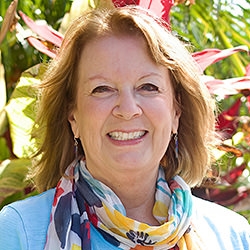
Search Results: attention
-
When avoidance coping or positive thinking sidesteps challenges, internal and external injustice and unrest also rises as we sidestep our values and integrity. It leaves us in sadness and distress. What's unacknowledged impacts ourselves and others undesirably. To live nonviolently we need to be in touch with what's real. With resonance we can more likely be with what's true, and trust our resilience and inner alignment.
-
"Falling out of love" is a misleading concept that can lead to feelings of helplessness in relationships. The initial intense phase of love gradually gives way to the need for intentional effort and communication. Unrealistic relationship expectations can erode connection, causing the perception of falling out of love. To address this, we can ask key questions and seek clarity to attend to unmet needs and maintain a healthy connection.
-
When deciding if someone crossed your boundaries and how to respond, you may get conflicting opinions on it. These opinions can be coarse attempts to manage life with rules about what should(n’t) happen. Instead, so that you can find where you want to invest your energy, ask yourself questions that reveal what for you is truly in integrity, nourishing, connects to your heart, and deepens self understanding. Read on for examples.
-
Two NVC trainers went into dangerous, war torn territory to share the skills they found so valuable but end up learning that they need to first apply those skills before those they came to help could receive what they had to offer. Only when the foundation of connection and trust was built could they mediate the conflicts using empathic communication.
-
Trainer Tip: In challenging situations, we can be peaceful and clear when we are able to connect to what we value most, and to act in harmony with those values. For example, if a coworker does something you don't like, instead of gossiping about their undesirable behaviors, you can talk to them about how both of you feel regarding what happened, and focus on the needs you're both trying to meet at work.
-
Have you ever had the experience of being truly heard and understood by another person? Or felt the astounding, breath-taking connection that arises when someone sheds all preconceived notions, gives you their full presence, and really sees you?
We call this The Amazing Power of Empathy – and the power does not stop there.
- Cultivate thriving interpersonal relationships
- Discover paths to move beyond anger, blame, and judgment
- Connect with the Divine essence in other people
- Experience greater ease and joy in all your interactions
-
What does nonviolence have to do with group facilitation?
Miki Kashtan believes that nonviolence is a way of being and living that orients us in all our thoughts, words and deeds toward the integration of truth, love and courage. All nonviolent individual and collective actions are aimed at preserving what serves life and challenging what does not. Facilitation is one clear path for bringing nonviolence to the world!
How can we act now, as facilitators, as if the world of our dreams, the Beloved Community, is already in place?
-
-
- Discover what is yours to do in response to our global crises
- Weave nonviolence more deeply into how you live and lead
- Receive ongoing support in how to be effective and alive while pursuing your highest goals
- Increase your capacity to face and mourn current reality as a source of greater choice and energy
- Be a part of transforming the legacy of scarcity, separation, and powerlessness into a livable future
-
Mindfulness is paying attention in a balanced and nonjudgmental way. To practice mindfulness is to uncover our own biases, revealing we less neutral and objective than we think. This takes great humility. Each time we become aware of our own unconscious biases and blind spots, our world expands. Read on for more about practices to help us see, and transform, our own biases.
-
When we're received with resonant understanding painful moments can lessen their charge and became part of the whole tapestry of life -- important but no longer able to hijack us into the eternal re-run of pain. When held this way, we can touch the memories with our attention the way one touches a newly repaired tooth with the tongue, searching for the old roughness, the old wound, but not finding it.
-
Goals and purposes can arise from intentions, but are different. Intentions arise from what's authentic, alive and aligned for you. Intentions can give you a sense of expansion, ease, and flow -- and are an essential part of any change process. Clear intentions can support decisions, management of resources, plus it can direct your attention effectively and with integrity. Read on for practices to find and implement your intention.
-
To help you stay connected to yourself and the other person when in challenging discussions about COVID-19 vaccines or other hot issues, without labeling others as reactive or otherwise, you can begin by tracking signs of your own reactivity to bring mindfulness onboard, then shifting your attention to universal needs; and asking to connect about it later. Read on for more.
-
A structured and clear contemplative practice can start with calming the body, heart, and mind for 20 minutes. Next, it contains at least three key elements: body awareness, clarifying what you already know, and consistent sustained attention. Celebrate and note insights, or any expanded perspective that pops into your awareness. Set an intention to notice these things in daily life and to practice further.
-
Setting boundaries takes being firmly grounded in self-respect and clear about what works for you. This means making conscious choices about how you relate to another or behave in a situation. Such clarity allows you to put your attention and energy where you want it to go. Thus we can have care and compassion without taking responsibility for others, nor feeling guilty when we say “no”. This takes awareness, skills, practice, healing and compassion.
-
Research shows that couples with a secure bond experience arguments that are shorter, lower in intensity, and easier to recover from. Building and keeping a secure bond with your partner requires mindfulness and consistency: respond to what’s needed or supportive in a given moment; give them your full attention and affection in a spacious greeting; conveying care, consideration, and that they matter and are seen.
-
Whether privileged or not, its not easy to see the humanity of others in different social locations, especially if their actions have unwanted impacts and have left behind our humanity. Aiming for “both sides hearing each other” empathically, and to focus on effect rather than intent when we have more privilege, may theoretically lead to liberation. Yet, in practice it can reinforce rather than transcend power differences -- unless there's specific ways to focus attention and choice. Here, its important to transform expectations into working with willingness, and within our own terms and timetable.
-
Yvette Erasmus shares that we can translate or shift how we hear right and wrong language. We can use the cue - What is needed? I wonder what they are needing? This helps direct my attention to more relationality.
-
- Discover what is yours to do in response to our growing global crises
- Weave nonviolence more deeply into how you live and lead
- Receive ongoing support within and beyond the course in how to be effective and alive while doing what’s yours to do
- Increase your capacity to face and mourn current reality as a source of greater choice and energy
- Be a part of transforming the legacy of scarcity, separation, and powerlessness into a livable future
-
While we can’t control other’s behavior, we can choose how we show up. With forethought and care, we can approach interactions with more clarity, love, and skill. Read on for practices that include: Choose wise attention, ask better questions, practice deep listening, structure the conversation, know your limits, speak your truth, share your personal stories, be present and recall permanence.





















